Hello, shepherd lovers today I will explain in detail why do German Shepherd puppies sleep a lot:
German Shepherd puppies are beloved pets for many families around the world. They’re known for their intelligence, loyalty, and versatility, making them popular choices for various roles, from family companions to working dogs. These puppies are delightful bundles of energy, but they also tend to sleep a lot, which might leave some owners wondering why.
Like human babies, German Shepherd puppies need plenty of sleep to grow and develop properly. Sleep is crucial for their physical and mental development, helping their bodies rest and recharge after all the exploring and learning they do during waking hours.

Puppies have high energy levels, but they also have limited stamina, so they need frequent naps throughout the day to keep up with their active lifestyle. Additionally, sleep plays a vital role in their brain development, helping them process new experiences and form memories. So, while it might seem like your German Shepherd puppy is always snoozing, they’re actually hard at work growing and learning, even in their dreams.
Hello everyone who loves dogs! I’m Dr. Arif Aziz, and I’ve been taking care of pets especially dogs at my clinic for a long time, exactly 14 years! I’m here to share some valuable information with you that I’ve gathered from books during my study time written by experts in veterinary medicine (DVM) and MSC (Master of Science), as well as from my own experiences working with dogs.
Firstly Understand Puppy Sleep Patterns :
Puppies, including German Shepherds, have pretty unique sleep patterns. They sleep a lot, often up to 18 to 20 hours a day! But don’t worry, it’s totally normal. Their sleep is usually split into short naps throughout the day, rather than one long snooze like adults. This is because puppies have so much growing and learning to do, and all that activity can be exhausting. Their bodies need lots of rest to keep up with their rapid development.
Now, why all this sleep? Well, it’s crucial for their growth and development. When puppies sleep, their bodies are hard at work. They’re busy growing new muscles, bones, and tissues. Plus, their brains are super active too, processing all the new things they’ve learned during playtime. Without enough sleep, puppies can become cranky and may even have trouble learning new things. So, all those puppy naps aren’t just for fun – they’re essential for your furry friend to become a happy, healthy adult dog.
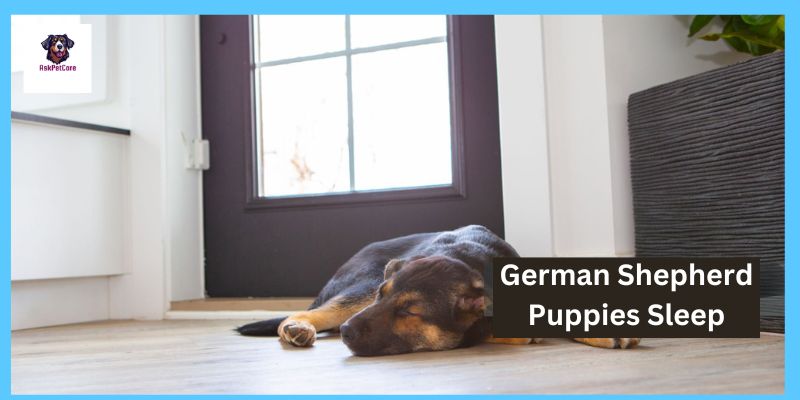
Now understand the Factors Influencing German Shepherd Puppy Sleep :
Growth spurts:
Just like human babies, German Shepherd puppies go through growth spurts. During these times, their bodies are growing super fast, which can make them extra tired. All that growing takes a lot of energy, so they need more sleep to recharge. You might notice your puppy sleeping even more than usual during these spurts, and that’s completely normal.
Energy expenditure:
Puppies are like little balls of energy! They have bursts of activity where they’re zooming around, playing, and exploring everything in sight. But after all that excitement, they need to rest and recover. Their bodies aren’t used to all this activity yet, so they get tired out pretty quickly. That’s why you’ll often see them take long naps after a big play session.
Mental stimulation:
Puppies are smart cookies, and they need mental exercise just as much as physical activity. When they’re not mentally stimulated, they can get bored, which might lead to restless sleep or trouble settling down. Providing your puppy with toys, puzzles, and training sessions can help keep their brains engaged and promote healthier sleep habits. So, it’s not just about running around – keeping their minds busy is important too!
Environmental factors:
The environment where your German Shepherd puppy sleeps can also influence their sleep patterns. A comfortable and quiet sleeping area free from distractions can help them settle down and rest more easily. Additionally, temperature plays a role – puppies may sleep more during hot weather to conserve energy, while cooler temperatures can encourage longer periods of rest. Creating a cozy and safe sleeping space for your puppy can contribute to better quality sleep and overall well-being.
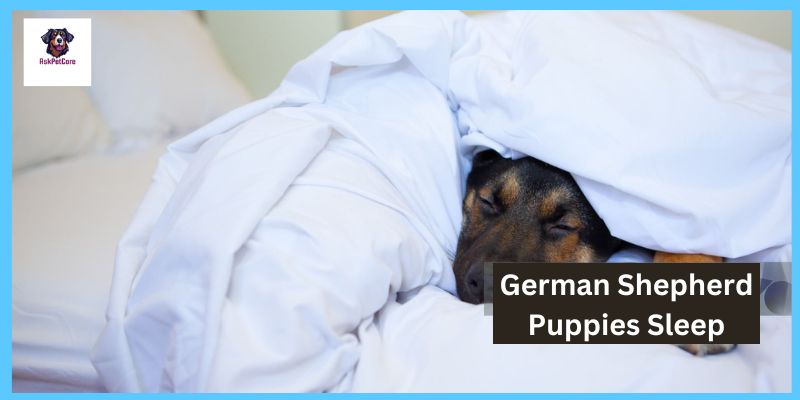
Social interaction:
Puppies are social animals and thrive on companionship. Spending quality time with their human family members or interacting with other dogs can be mentally stimulating and emotionally fulfilling for them. Positive social interactions can help reduce stress and anxiety, promoting better sleep quality. However, excessive excitement or overstimulation from social interactions close to bedtime may lead to difficulty settling down for sleep. Finding the right balance of socialization and quiet time can support healthy sleep habits for your German Shepherd puppy.
| Factors Influencing German Shepherd Puppy Sleep | Description |
| Growth spurts | Periods of rapid growth require more sleep. |
| Energy expenditure | Bursts of activity followed by long periods of rest. |
| Mental stimulation | Importance of engaging activities for mental health. |
| Environmental factors | Comfortable sleeping environment and suitable temperature. |
| Social interaction | Positive social interactions for emotional well-being. |
Health Considerations. Role of sleep in immune system function and overall health. Signs of potential health issues if a puppy is sleeping excessively.
Role of sleep in immune system function and overall health:
Sleep is incredibly important for a puppy’s immune system and overall health. During sleep, the body produces proteins called cytokines, which are essential for fighting off infections and inflammation. Without enough sleep, a puppy’s immune system may not function optimally, making them more susceptible to illnesses. Additionally, sleep plays a crucial role in growth and development, as the body repairs and regenerates tissues during restful periods. Adequate sleep also supports cognitive function and emotional well-being, helping puppies learn and process new experiences effectively.
Signs of potential health issues if a puppy is sleeping excessively:
While puppies do need plenty of sleep, excessive sleeping can sometimes be a sign of underlying health issues. If a puppy is sleeping much more than usual or seems lethargic and unresponsive when awake, it could indicate a problem. Other signs to watch out for include changes in appetite, weight loss, vomiting, diarrhea, or difficulty breathing. These symptoms may indicate conditions such as infections, hormonal imbalances, or gastrointestinal issues. If you notice any concerning signs or if your puppy’s sleep patterns change suddenly, it’s essential to consult with a veterinarian for a thorough evaluation and appropriate treatment.
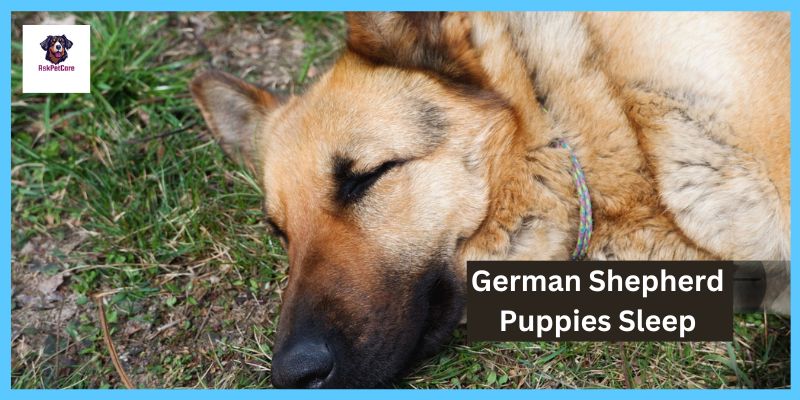
Tips for Managing Puppy Sleep:
- Establishing a regular sleep schedule: Creating a consistent bedtime routine can help regulate your German Shepherd puppy’s sleep patterns. Try to establish set times for meals, playtime, and bedtime to help them develop healthy sleep habits.
- Providing a comfortable sleeping environment: Make sure your puppy’s sleeping area is cozy, quiet, and free from distractions. Provide a comfortable bed or crate with soft bedding where they can feel safe and secure.
- Ensuring proper nutrition and hydration: A balanced diet and access to fresh water are essential for your puppy’s overall health, including their sleep quality. Make sure they’re getting the right nutrients to support their growth and development.
Why do German shepherd puppies sleep a lot all:
German Shepherd puppies sleep a lot because their bodies are growing and developing rapidly. Just like babies need plenty of sleep to grow into strong and healthy children, puppies need sleep to become strong and healthy dogs. Sleep is essential for their bodies to repair and grow muscles, bones, and tissues. It’s like their bodies are doing important construction work while they snooze!
Puppies also sleep a lot because they have loads of energy but limited stamina. They have bursts of playful energy where they zoom around, chase toys, and explore their surroundings. After all that excitement, they need to rest and recharge their batteries. Plus, puppies’ brains are super busy too! They’re learning tons of new things every day, and sleep helps their brains process all that information. So, all those puppy naps aren’t just for fun – they’re vital for your furry friend to become a happy and healthy adult dog.
Why do German shepherd puppies sleep a lot after:
German Shepherd puppies tend to sleep a lot after activities because they need time to recover and rest their bodies. Just like when we humans exercise or play sports, our muscles get tired and need a break to recover. Similarly, when puppies play, run around, or explore, their muscles get tired too. After all that fun, they need to take a nap to give their muscles a chance to rest and repair.
Another reason why German Shepherd puppies sleep a lot after activities is because their bodies are still growing and developing. All that running and playing actually takes a lot of energy! So, after a busy play session, puppies often feel sleepy because their bodies are working hard to grow bigger and stronger. Think of it like recharging a battery – after using up lots of energy, it’s time to rest and recharge for the next adventure!
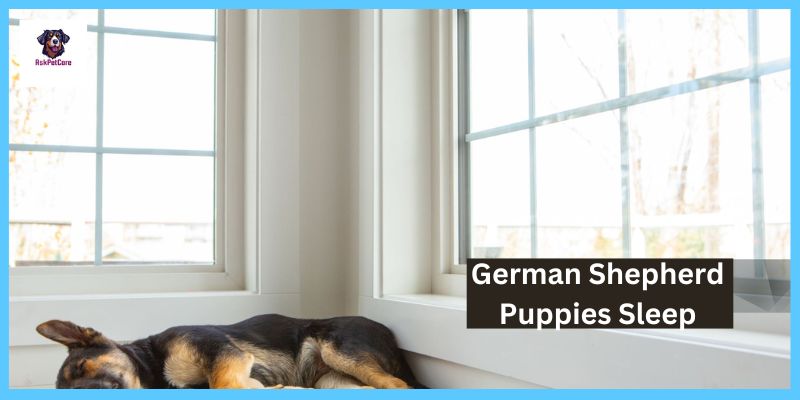
How much should a 6-month-old German shepherd sleep:
A 6-month-old German Shepherd puppy typically needs about 14 to 16 hours of sleep every day. This might seem like a lot, but remember, puppies are growing and developing rapidly, and sleep is crucial for their health and well-being.
During this stage of their life, German Shepherd puppies are like little bundles of energy. They have bursts of activity where they run around, play, and explore everything in sight. But all that excitement can be tiring! So, they need plenty of rest to recharge their batteries and help their bodies grow big and strong.
You might notice that your puppy takes short naps throughout the day, usually after playtime or meals. These naps are important for them to recover from their adventures and process all the new things they’ve learned. It’s also normal for puppies to have longer sleep sessions at night, just like humans do. So, if your 6-month-old German Shepherd puppy seems to be sleeping a lot, don’t worry – it’s all part of their natural growth and development process.
How much does a 1-year-old German shepherd sleep:
A 1-year-old German Shepherd usually needs around 12 to 14 hours of sleep every day. By this age, they’re not quite as active as they were when they were puppies, but they still need plenty of rest to stay healthy and happy.
At one year old, German Shepherds are still growing, albeit at a slower pace than when they were puppies. Sleep is essential for their bodies to continue developing muscles, bones, and tissues. Plus, it helps them recharge after any activities or exercise they’ve had during the day.
You might notice that your 1-year-old German Shepherd sleeps for longer periods at night and takes shorter naps during the day. This is because their sleep patterns start to resemble those of adult dogs. However, they may still have bursts of energy and enjoy playtime, so it’s essential to provide them with opportunities for both activity and rest. Overall, ensuring your 1-year-old German Shepherd gets enough sleep helps them maintain their health and vitality as they transition into adulthood.
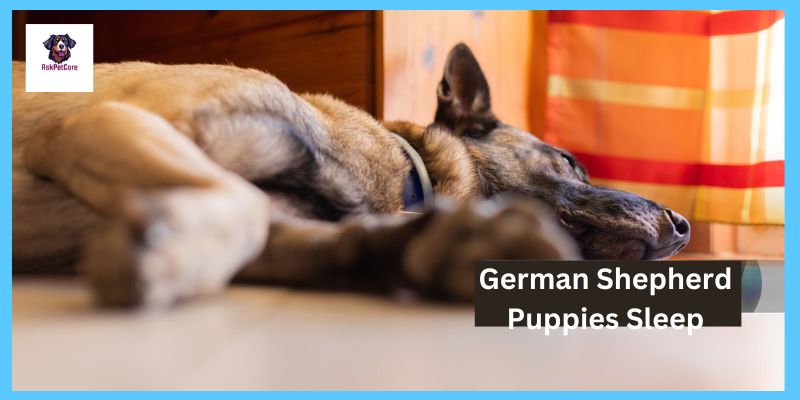
How long do German shepherds sleep at night:
German Shepherds typically sleep around 8 to 10 hours at night, just like humans do. However, this can vary depending on factors like age, activity level, and individual preferences.
When German Shepherds are puppies, they might need more sleep at night, often up to 12 hours. As they grow older and become adults, their nighttime sleep tends to decrease slightly, but they still need a good amount of rest to stay healthy and energized.
During the night, German Shepherds may have several sleep cycles, just like humans do. They might have periods of deep sleep, where they’re completely still and relaxed, followed by lighter sleep where they might move around or even dream.
It’s important to provide your German Shepherd with a comfortable sleeping environment at night, such as a cozy bed or crate, to help them get the rest they need. Additionally, sticking to a consistent bedtime routine can help them settle down and sleep well through the night. Overall, ensuring your German Shepherd gets enough sleep at night is essential for their overall health and well-being.
How much does a 2-month-old German shepherd sleep:
A 2-month-old German Shepherd puppy typically sleeps a lot, usually around 18 to 20 hours a day. That might sound like a whole lot of snoozing, but it’s completely normal for puppies at this age.
You see, at 2 months old, German Shepherd puppies are like tiny bundles of energy, but they also have super-fast-growing bodies. All that growing takes a ton of energy, so they need lots of sleep to recharge their batteries. Plus, puppies are like little sponges, soaking up all the new experiences and information around them. Sleep helps their brains process all this new stuff and helps them grow into smart, healthy adult dogs.
You’ll probably notice that your 2-month-old German Shepherd puppy takes lots of short naps throughout the day. These naps are like power naps – they help your puppy rest and recover so they can bounce back full of energy for their next playtime adventure. So, if your little furball seems to spend most of their time snoozing at 2 months old, don’t worry – it’s all part of being a growing puppy!
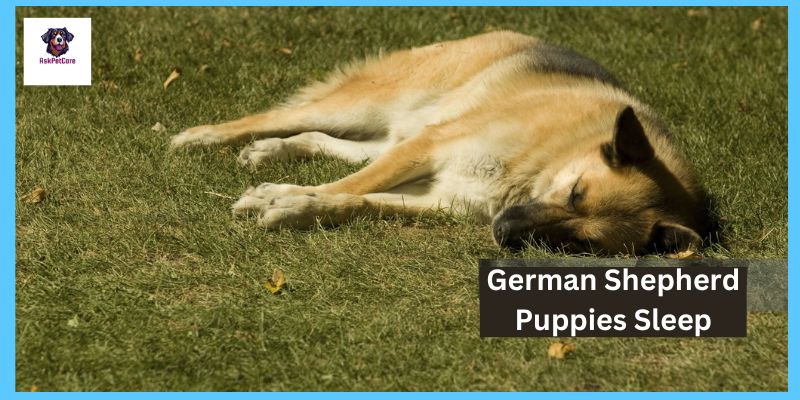
Why does my German shepherd sleep by the door:
Your German Shepherd might choose to sleep by the door for a few reasons, and it’s perfectly normal behavior.
Firstly, dogs are instinctively protective of their territory and their family. Sleeping by the door allows them to keep watch over their surroundings and alert you to any potential dangers or intruders. This behavior harks back to their ancestry as working dogs, where they were often tasked with guarding homes and property.
Additionally, sleeping by the door might provide your German Shepherd with a sense of security and comfort. Dogs often seek out cozy spots where they feel safe, and the door might represent a boundary between the inside of the house and the outside world. Being close to the door allows them to feel in control of their environment and ready to spring into action if needed.
Lastly, dogs are creatures of habit, and your German Shepherd might have simply found that sleeping by the door feels comfortable or familiar to them. They might enjoy the cool breeze that comes through the door or the ability to keep an eye on family members coming and going.
Overall, there’s likely a combination of protective instincts, comfort, and habit that influence your German Shepherd’s choice to sleep by the door. As long as they’re comfortable and not exhibiting any signs of stress or anxiety, it’s perfectly fine for them to continue this behavior.
How long do German shepherd puppies sleep at night:
German Shepherd puppies typically sleep around 8 to 10 hours at night, just like humans do. However, this can vary depending on factors like their age, activity level, and individual needs.
When they’re very young, like around 8 to 12 weeks old, German Shepherd puppies may need more sleep at night, often up to 12 hours. As they grow older and become more accustomed to their routines, their nighttime sleep tends to decrease slightly.
During the night, German Shepherd puppies may have several sleep cycles, just like humans. They might have periods of deep sleep, where they’re completely still and relaxed, followed by lighter sleep where they might move around a bit or even dream.
It’s important to provide your German Shepherd puppy with a comfortable sleeping area at night, such as a cozy bed or crate, to help them feel safe and secure. Keeping a consistent bedtime routine can also help them settle down and sleep well through the night. Overall, ensuring your puppy gets enough sleep at night is essential for their growth, development, and overall well-being.
How many hours should a German Shepherd puppy sleep?
German Shepherd puppies typically need around 18 to 20 hours of sleep each day. This might seem like a lot, but puppies are growing rapidly, both physically and mentally. Sleep is crucial for their development and helps them recharge after their active play and learning sessions.
Why is my German Shepherd puppy so lazy?
There could be several reasons why your German Shepherd puppy appears lazy. Firstly, puppies have bursts of energy followed by periods of rest, so what may seem like laziness could just be their natural sleep cycle. However, if your puppy seems excessively lethargic or lacks interest in activities, it’s essential to consider factors like health issues, diet, or environmental stressors. Consulting with a veterinarian can help rule out any underlying medical concerns.
Is it normal for a 3-month-old puppy to sleep a lot?
Yes, it’s entirely normal for a 3-month-old puppy, including German Shepherds, to sleep a lot. At this age, puppies are still very young and growing rapidly. They need plenty of rest to support their physical and mental development. As they grow older, their sleep patterns may gradually shift, but it’s essential to ensure they continue getting enough rest as they mature.
Is it normal for puppies to be sleepy all the time?
Yes, it’s normal for puppies to be sleepy much of the time, especially during their early months of life. Puppies have high energy levels, but they also have limited stamina and need frequent naps to recharge. Additionally, puppies go through rapid growth and development, which requires a lot of energy and rest. However, if you notice any excessive lethargy or changes in your puppy’s behavior, it’s a good idea to consult with a veterinarian to rule out any potential health concerns.
I hope you will thoroughly understand why German Shepherd Puppies Sleep a lot and the factors that effect sleep. Still, any quarry contacts me.
Here are some reference books that are considered authoritative on the topic of dog care, including nail care:
- “The Complete Dog Owner’s Manual” by Dr. Bruce Fogle
- “The Ultimate Guide to Dog Care: Everything You Need to Know to Keep Your Dog Happy and Healthy” by Amy Marder and Andrew Luescher
- “The Veterinarians’ Guide to Natural Remedies for Dogs: Safe and Effective Alternative Treatments and Healing Techniques from the Nations Top by Martin Zucker
